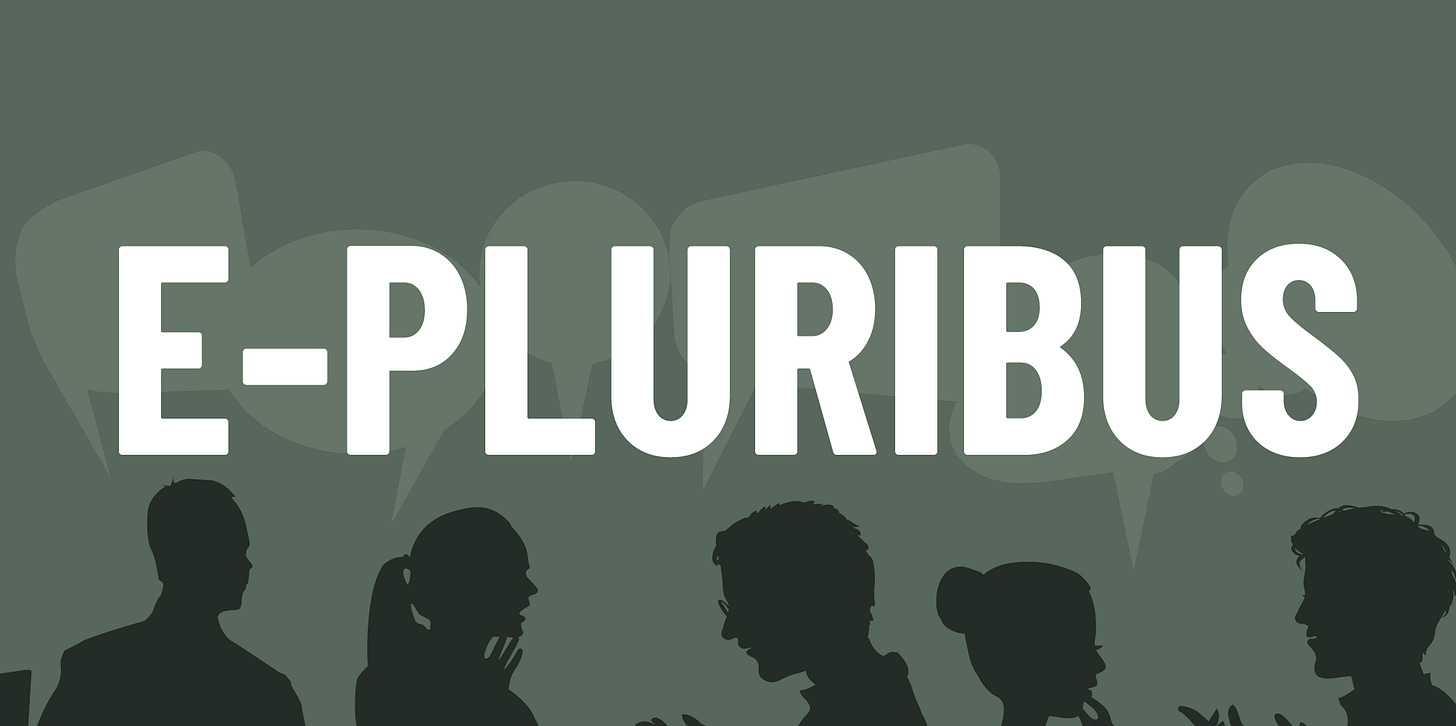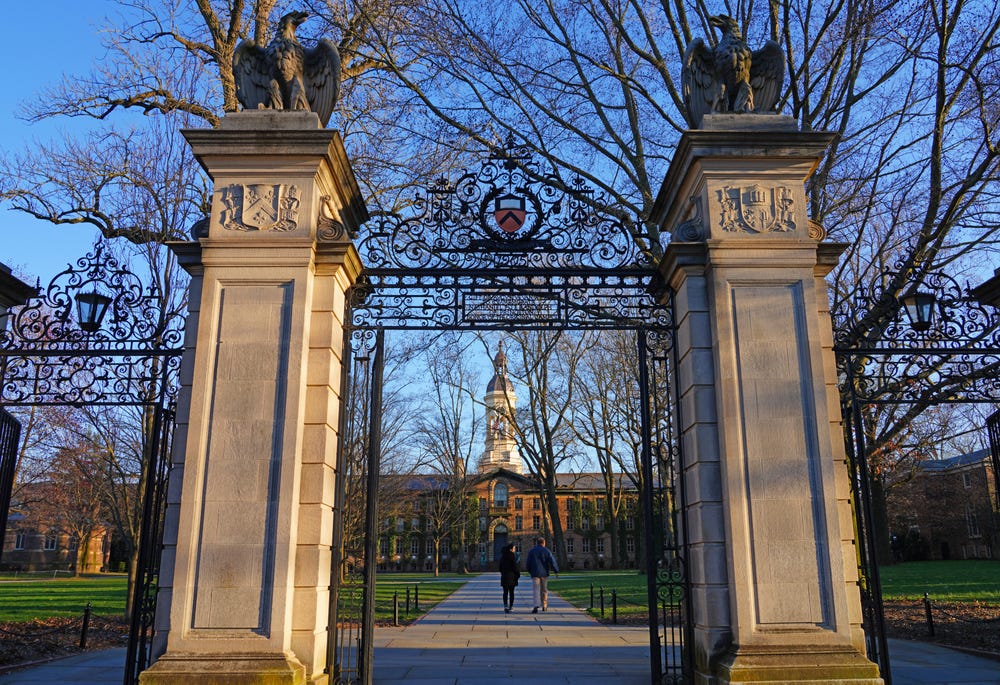E-Pluribus | January 18, 2022
The connection between higher education and politics, the ACLU (yes, *that* ACLU) defends religious freedom, and a defense of academic impartiality.
A round up of the latest and best writing and musings on the rise of illiberalism in the public discourse:
John Ellis: Can Politics Get Better When Higher Education Keeps Getting Worse?
The late Andrew Breitbart liked to say that “politics is downstream of culture.” Writing at the Wall Street Journal, John Ellis says that if politics is also downstream from academia, we’re in a lot of trouble.
[…] Leftist radicalism is still strengthening on college campuses, and campus influence on our society still is intensifying.
Why is this happening? The shocking developments of the past few years are the result of a plan formulated by Marxist radicals of Students for a Democratic Society in 1962 and published in the Port Huron Statement. SDS decided that given their lack of success at the ballot box, their only choice was to try to seize control of academia and use universities to convert young people to their ideology. That plan seemed fanciful at the time because the campuses were balanced politically, but radicals patiently built their numbers until they had achieved a 5-to-1 left-right faculty ratio by the turn of the century. That dominance allowed radicals to control most new faculty appointments, and the left-right ratio accelerated dramatically, reaching about 12 to 1 by 2016.
Where are we headed now? On campus, radicalism grows stronger each day. The current left-right campus faculty ratio is probably about 15 to 1, but new appointments are being made at a rate of about 50 to 1. As we approach complete leftist saturation among professors, college campuses will become even more intolerant, irrational and politically aggressive.
More important still, academia’s influence on society will intensify as the number of people who have graduated from radicalized campuses increases and the number of those who graduated with a conventional college education declines. A generation—students from about 2000 to now—has graduated from one-party campuses. Where will we be when two generations have done so and another generation has died off?
Read it all.
David Cole: In this case, the Constitution requires a city to display a religious flag
Pluribus has covered how some civil liberties and free speech organizations have strayed from their original missions, none perhaps more notoriously than the American Civil Liberties Union. It is notable then that David Cole, national legal director for the ACLU, has taken to the pages of the Washington Post to promote his organization’s support of a Christian group’s argument in a case currently before the Supreme Court.
So why [is the A.C.L.U.] supporting a Christian organization’s argument in the Supreme Court case Shurtleff v. Boston that it has a right to display a flag bearing the Latin cross in front of Boston’s City Hall? The short answer: The First Amendment requires it.
[…]
Religious expression cannot be completely excluded from public property. If that were the case, the government could ban Jehovah’s Witnesses from handing out religious tracts on public sidewalks. And free speech principles prohibit the government from discriminating against speakers because of their messages — including religious messages.
The central issue is whether the religious expression is properly attributed to the government or to private speakers. Where the government itself is “speaking,” the establishment clause generally prohibits religious messages, and the free speech clause generally does not apply. But where private speech is involved, establishment clause concerns are diminished, and the free speech clause requires the government to treat all speakers equally.
We argue that no reasonable observer would understand flying Camp Constitution’s flag — for just one hour on a single day — to be the government’s speech. Like the 284 flags flown before it, this group’s flag would be seen as just that — the group’s flag. And as such, the city can’t turn it down because the flag is religious.
Read it all here.
Matt Beard: The Importance of Academic Impartiality
Matt Beard, a Carleton University graduate student of political science, writes at Quillette about the necessity of an impartial pursuit of knowledge and the truth, reaching back into an admittedly fraught time in history to do so. Beard draws from the writings of German philosophers Max Weber and Hannah Arendt to make the case that educators must eschew the impulse to allow their political views to override their primary function.
Heidegger and Schmitt are extreme examples of professors allowing politics to cloud their academic responsibilities, to say the least. I do not raise the horrors of Weimar in an attempt to write a cheap polemic about culture-war issues on campus today. Rather, I believe that studying the response to academic overreach in Weimar, particularly from the philosophers Max Weber and Hannah Arendt, may clarify the foundations of our academic speech debates today. Extreme examples often push thinkers to consider problems more deeply, which Weber (a contemporary of Schmitt’s) and Arendt (a student of Heidegger’s) surely did.
[…]
All of society benefits when institutions such as academia and journalism are protected from public influence, provided that they uphold their responsibility to impartially seek the truth. Activists on Twitter and university administrators both seem to have forgotten that the political realm benefits from a space which it cannot touch. For whatever reason (perhaps because “impartiality and the disinterested pursuit of truth” do not poll well as marketing slogans), many university bureaucrats now perceive too much risk in overseeing “refuges of truth.” Rather than keeping the university outside the power struggle of daily politics—protecting faculty members from the “dangers arising from social and political power”—professors are frequently reprimanded for controversial speech.
[…]
Opponents of this argument may protest that “impartiality” provides a cover for a racist and patriarchal status quo. Scholarship may demand interrogating various forms of oppression, even or perhaps especially by entering the political realm. In this view, the university should use its special status not to pursue the false ideal of “impartiality,” but to sharply critique the rest of society. Power, not intellectual rigor, is the main force shaping our search for truth.
While I disagree with much of this perspective, I still believe it moves the academic freedom debate in the right direction today. Firstly, because it could be right. When facing uncomfortable ideas we should try to understand them with our best empirical and philosophical resources. But mainly, this critique has value because critical theorists invite a debate about the core issues—the nature of truth and the purpose of academia itself. This is what we are really debating when we speak of the latest campus “cancellation.”
Read the whole thing.
Around Twitter
Via Thomas Chatterton Williams and Ed West, the UK’s national art gallery network, Tate Britain, had adopted a rather unique approach in its latest exhibition:
A Jesse Singal thread on why “science!” isn’t always the cut-and-dried answer to everything:
Thoughts from Wesley Yang on finding truth:
And finally, Glenn Greenwald with the Rules of Discourse:











